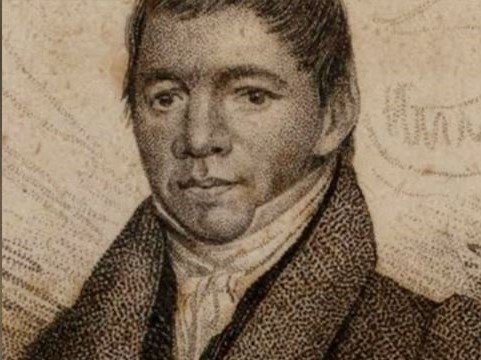Portrait of William Apess: a 19th century Pequot author, activist and minister, who upended the way New England’s history was told and insisted on the equal rights of Native people.
The Puritans saw their settlement as a divinely blessed endeavor, sanctioned by higher powers. In this light, people who lived in the “new” land had to accommodate the newcomers and, in the popular imagination in the following centuries, to take their place in history as savages who deserved obliteration.
For William Apess, member of the Pequot tribe and Methodist minister in the early 19th century, such a version of history was both incorrect and unjust. What if, he asked his readers, we reimagined history? If an enemy power arrived on American soil, he told them in his powerful writings, “it would be called an insult, and every white man would be called to go out and act the part of a patriot, to defend their countr[y’s] rights; and if every intruder were butchered, it would be sung upon every hilltop in the Union that victory and patriotism was the order of the day.” By contrast, he wrote, “when a few red children attempt[ed] to defend their rights, they are condemned as savages.”
In this book club Zoom meeting, we will discussed how William Apess took up his pen to fight for justice through reading one of his most hard-hitting publications, his 1836 Eulogy on King Philip. Delivered as an oration in Boston, it is a work which turns upside down a Eurocentric story of early New England history.
Our discussion was led by scholar Drew Lopenzina, professor of early American and Native American literature and author of multiple books, chapters and articles on Native writers and writings. In addition to Eulogy on King Philip, we read a chapter from of Dr. Lopenzina’s Red Ink: Native Americans PIcking Up the Pen in the Colonial Period. We also suggested readings from Dr. Lopenzina's new book, Through An Indian’s Looking Glass: A Cultural Biography of William Apess, Pequot. These works are posted on the “Readings” page of our website; if you would access (the page is password protected), let us know at phbostons@gmail.com.
Apess' Eulogy challenged most historians' version of King Philip’s War – which, by the time he delivered his address, was a well-established tale of Indians slaughtering innocent colonists. But he also dismantled the 19th century insistence that Native people had gradually become extinct. We will read the Eulogy from both points of view – for what Apess says about the reality of the 17th century conflict, and for his views on historians and the embedded critique of the politics of removal ongoing during his lifetime. And we will understand it from the lens of what Drew Lopenzina calls “unwitnessing” – the deliberate oblivion cast over Indigenous voices, lives and rights – and witnesses the courage of a writer making the intellectual argument for Native rights, Native sovereignty, and peaceful coexistence on the land.
* * *
Drew Lopenzina is professor of early American and Native American literature at Old Dominion University in Norfolk, Virginia. Earlier this year he was awarded the Richard Beale Davis Prize by the Modern Language Association Forum for his publication, “’In De Dark Wood: No Indian Nigh’: William Apess and ‘The Indian Hymn.’” His book Red Ink: Native Americans Picking up the Pen in the Colonial Period (Albany: SUNY Press, 2012) offers a rethinking of indigenous engagement with literacy in the colonial period, suggesting how much of what we think we know about colonial literature is based on a misunderstanding of Native contributions. He is also the author of a cultural biography of William Apess, Through an Indian’s Looking Glass: A Cultural Biography of William Apess, Pequot (Amherst: University of Massachusetts Press, 2017). He has written numerous book chapters and articles for journals including American Literature, American Quarterly, and Native American and Indigenous Studies.
This program was supported by a grant from the Bridge Street Fund, a special initiative of Mass Humanities. We are grateful for their contribution.

